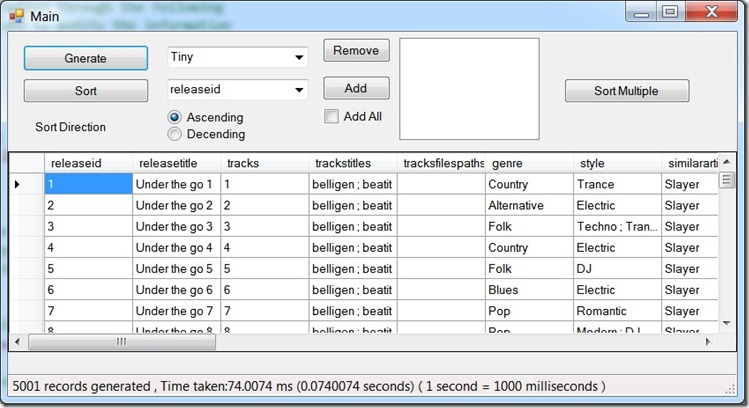Generic Sorting using C# and Lambda Expression
Posted
by Haitham Khedre
on ASP.net Weblogs
See other posts from ASP.net Weblogs
or by Haitham Khedre
Published on Wed, 21 Nov 2012 01:41:00 GMT
Indexed on
2012/11/21
5:01 UTC
Read the original article
Hit count: 574
c#
Download : GenericSortTester.zip
I worked in this class from long time and I think it is a nice piece of code that I need to share , it might help other people searching for the same concept.
this will help you to sort any collection easily without needing to write special code for each data type , however if you need special ordering you still can do it , leave a comment and I will see if I need to write another article to cover the other cases.
I attached also a fully working example to make you able to see how do you will use that .
public static class GenericSorter { public static IOrderedEnumerable<T> Sort<T>(IEnumerable<T> toSort,
Dictionary<string, SortingOrder> sortOptions) { IOrderedEnumerable<T> orderedList = null; foreach (KeyValuePair<string, SortingOrder> entry in sortOptions) { if (orderedList != null) { if (entry.Value == SortingOrder.Ascending) { orderedList =orderedList.ApplyOrder<T>(entry.Key, "ThenBy"); } else { orderedList =orderedList.ApplyOrder<T>(entry.Key,"ThenByDescending"); } } else { if (entry.Value == SortingOrder.Ascending) { orderedList =toSort.ApplyOrder<T>(entry.Key, "OrderBy"); } else { orderedList =toSort.ApplyOrder<T>(entry.Key, "OrderByDescending"); } } } return orderedList; } private static IOrderedEnumerable<T> ApplyOrder<T>(this IEnumerable<T> source, string property, string methodName) { ParameterExpression param = Expression.Parameter(typeof(T), "x"); Expression expr = param; foreach (string prop in property.Split('.')) { expr = Expression.PropertyOrField(expr, prop); } Type delegateType =typeof(Func<,>).MakeGenericType(typeof(T), expr.Type);LambdaExpression lambda =Expression.Lambda(delegateType, expr, param); MethodInfo mi = typeof(Enumerable).GetMethods().Single( method => method.Name == methodName && method.IsGenericMethodDefinition && method.GetGenericArguments().Length == 2 && method.GetParameters().Length == 2) .MakeGenericMethod(typeof(T), expr.Type); return (IOrderedEnumerable<T>)mi.Invoke(null, new object[] { source, lambda.Compile() }); } }
© ASP.net Weblogs or respective owner
